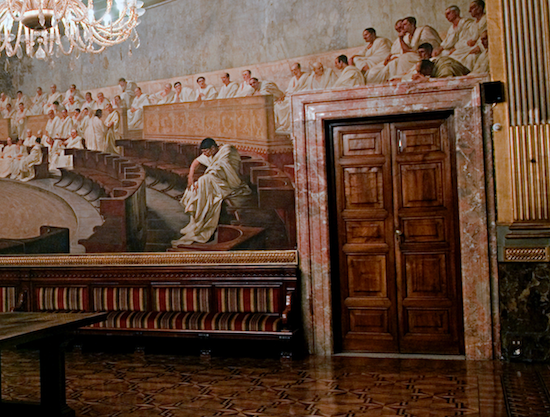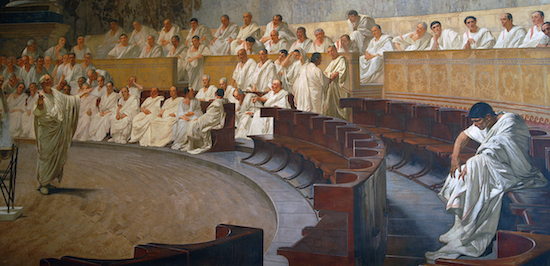Ceterum autem censeo Twiterinem esse delendam
The fresco is housed in a room that is small, but quite ornate. Four corner-anchored medallions define the lower-than-expected ceiling's borders. Though they are intended to represent agriculture, trade, science, the arms, and the arts, they are often overlooked. Bulky gold brackets that appear to be structural: the only supports preventing the absurdly large chandeliers from dragging the plaster (and the rest of the ceiling) down with them. Like a modern casino floor, they appear intended to draw the eye downward towards the slot machines, the blackjack table, and the roulette wheel, though these exist only metaphorically. The coarse reference to gambling, social engineering, and manipulation should come as no surprise at all. After all, we speak now of the Palazzo Madama, the seat of the Senate of the Italian Republic.
It is impossible to un-see the bottom half of the room and the floor tiles-an insane montage of age-of-discovery era compass-roses fused with a hallucinogenic motif. One might guess that M. C. Escher was consulted but for the fact that Sala Maccari (the "Maccari Salon") was decorated in 1889, nearly ten years before he was born.
To look further is to condemn the eye to blur to the point of watering: gold trim, red stripes, a riot of carved pink granite lining the very doorways-quite ornate to be sure. The walls are lined with modest benches, demure (one does not coddle Senate pages) but for the aggressive, vertical pattern of the upholstery on the cushions, strongly reminiscent of the ribbon worn by recipients of the American Silver Star medal, if the decoration was first stained with blood, that is.
The fresco is ill-fitted for the room or, at least, the decorators felt the pink granite doorways were more important. How else might one explain the fact that fully one eighth of the work has been punched out by one of the critical portals? Perhaps the subject matter offended those who commissioned the work. Perhaps with reason. The fresco is, of course, "Cicerone denuncia Catilina" ("Cicero Denounces Catilina"), the work by Cesare Maccari depicting the first of Cicero's orations denouncing Lucius Sergius Catilina.

The always savvy finem respice reader will know the oration well:
Quo usque tandem abutere, Catilina, patientia nostra? Quam diu etiam furor iste tuus nos eludet? Quem ad finem sese effrenata iactabit audacia? Nihilne te nocturnum praesidium Palati, nihil urbis vigiliae, nihil timor populi, nihil concursus bonorum omnium, nihil hic munitissimus habendi senatus locus, nihil horum ora voltusque moverunt? Patere tua consilia non sentis, constrictam iam horum omnium scientia teneri coniurationem tuam non vides? Quid proxima, quid superiore nocte egeris, ubi fueris, quos convocaveris, quid consili ceperis quem nostrum ignorare arbitraris?1
When, O Catiline, do you mean to cease abusing our patience? How long is that madness of yours still to mock us? When is there to be an end of that unbridled audacity of yours, swaggering about as it does now? Do not the nightly guards placed on the Palatine Hill—do not the watches posted throughout the city—does not the alarm of the people, and the union of all good men—does not the precaution taken of assembling the senate in this most defensible place—do not the looks and countenances of this venerable body here present, have any effect upon you? Do you not feel that your plans are detected? Do you not see that your conspiracy is already arrested and rendered powerless by the knowledge which every one here possesses of it? What is there that you did last night, what the night before— where is it that you were—who was there that you summoned to meet you—what design was there which was adopted by you, with which you think that any one of us is unacquainted?
And then, perhaps the more famous of utterances in the oration:
O tempora, o mores!
Oh the times, oh the customs!
This appears to be a recurring theme with Cicero. He also used the turn of phrase in the fourth book of his second oration against Verres (whose administration of Sicily was notably corrupt). One does not have to be a fan of Cicero to sympathize. Catilina was alleged (rather credibly, the astute finem respice reader may recall) to have conspired to overthrow the Roman government and, as if that were not enough, to assassinate Cicero himself. Still, despite a senatus consultum ultimum ("Final decree of the Senate"), somehow Catilina had not been executed. He was, in fact, still sitting in the Temple of Jupiter Stator (or, according to Cesare Maccari's fresco, though this was likely in error, the Senate House) when Cicero delivered his indictment.
Oh the times, oh the customs!
And this brings us to the topic that now rouses finem respice from her long slumber: Twitter.
For years various social media juggernauts have sought to induce users to submit phone numbers, particularly mobile phone numbers, even in the face of demonstrably poor security administration. Facebook, ever the brazen one, began to sell the acquisition of private numbers as a security feature (two factor authentication, you understand, no?)
Of course, such information would never, ever be used for advertising or tracking purposes. Never. Until it was.
Now, Twitter, under the auspices of regulating "automated accounts" (read "Russian bots") is flagging a number of accounts for "unusual activity" and locking them. How does one unlock one's Twitter account? Surely, the astute finem respice reader has already guessed:

Three tweets into the evening, finem respice found its Twitter account locked for "suspicious activity". Long time readers will know this is the second time, and the original finem respice account remains suspended to this day, many years later. Attempting to have the account unlocked without providing a cell-phone number results in an infinite loop of customer service pages and emails that point right back to the original solution: "Why not just give us your cell phone number?"
Ah... of course.
O tempora, o mores!
It is amazing to finem respice that Facebook, YouTube, Twitter, and Instagram (which has polluted a good 7.5% of the internet with its walled influencer-driven cesspool economy garden) do not find themselves, like Catilina, relegated to the far corner of the Roman Senate: friendless, homeless, and, after his flight from Rome and wholesale defections from his army, faced with inevitable defeat at the hands of Antonius Hybrida (his one time ally).

Hopeless, Catilina at least had a sense of personal honor that caused him to throw himself into the fray with his men. At least in terms of Roman morays, it might be said of him that he was honorably slain with his soldiers. And, in fact, it was:
Catiline was found, far in advance of his men, among the dead bodies of the enemy; a most glorious death, had he thus fallen for his country.2
It beguiles the imagination what users of these modern California-tech, Catilinarian conspiracies are willing to tolerate. Cicero was right to wonder. Somehow I doubt that the likes of Jack Patrick Dorsey will be found "far in advance of his" employees if Twitter ever faces whomever the modern Antonius Hybrida is.
Farewell, Twitter.
Also: Go fuck yourself.
- 1. "Oratio in Catilinam Prima in Senatu Habita," Marcus Tullius Cicero. Translation: Latin (Albert Clark, Albert Curtis Clark, 1908)
- 2. "Epitome of Roman History," "The Insurrection of Catiline", Florus (74 AD-130 AD) [Translation by John Selby Watson (1889)]
Entry Rating:
